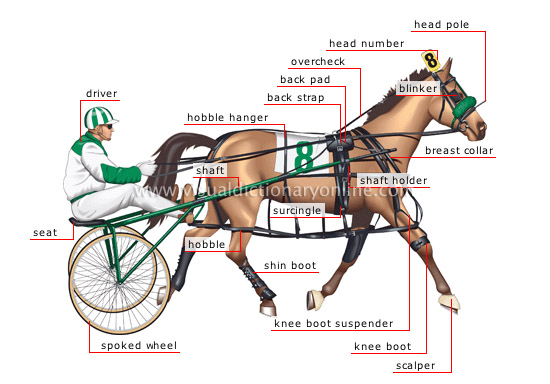pacer
A horse that paces, that is, raising both legs on the right side, then, as those legs come down, raising both legs on the left side.
shaft 
Wooden or metal arm that extends the sulky; the horse is harnessed between the two of them.
driver 
Person who steers the horse; the driver’s main task is to restrain the horse to conserve its energy for the right moment.
knee boot suspender 
Strap that goes around the horse’s wither; it keeps its knee boot in place.
spoked wheel 
Round unit that is held by fine metal rods radiating from an axle; it allows the sulky to move.
seat 
Part on which the driver sits to steer the sulky.
shin boot 
Equipment placed around the cannon of the horse’s leg to protect it from injury.
hobble 
Set of straps on each side of the horse that connect the forelegs and hind legs; they help the horse maintain the pace.
hobble hanger 
One of four straps that support the hobble.
shaft holder 
Strap that attaches the shaft to the horse’s harness.
surcingle 
Strap that goes under the horse’s belly; it keeps the back pad and shaft holder in place.
scalper 
Usually rubber item of equipment that covers the horse’s hoof to prevent injury.
knee boot 
Rigid equipment that protects the horse’s knee.
breast collar 
Part of the harness that goes around the horse’s neck; it transmits the horse’s movement to the shaft.
back pad 
Padded part set on the horse’s back; the back strap goes over it.
head pole 
Stick attached along the horse’s head; it prevents the horse from turning its head during turns.
blinker 
Rigid part that is attached to the cheek strap; it reduces the horse’s lateral vision.
head number 
Numbered plate that is attached to the horse’s head for identification by the public and the judges.
overcheck 
Strap that connects the bridle to the back pad; it lifts the horse’s head so it maintains the pace.
back strap 
Reinforced strap that is attached to the back pad; it is fitted with girths that can be attached to the shafts.










